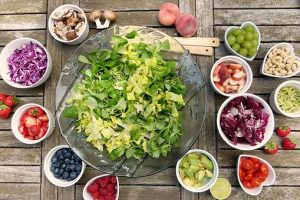Vitamins and Minerals Seniors Need Most

As we age, we need to make sure that we are getting the vitamins and minerals seniors need most so that we can stay healthy. Here is a partial list of what we need to do this.
Vitamin D
Your body needs this vitamin so that your cells continue to absorb calcium well. People get some vitamin D from sunlight, so making sure that you have some exposure to sunlight will help you. But since your body is less able to convert sun’s rays to vitamin D as you age, you may want to increase your intake of foods that contain vitamin D like salmon, mackerel, and sardines. Vitamin D also helps your muscles, nerves, and immune system to work right.
Vitamin B12, 6 and 9
The B vitamins help in a wide range of things so you want to make sure that you get them all.
- Vitamin B12 helps make blood and nerve cells. You can find it in animal foods like meat, fish, eggs, and dairy and in B12-fortified foods, like breakfast cereal. If you are low in vitamin B12, you may consider shots or pills. Up to 30% of people over 50 have atrophic gastritis. This condition makes it harder for your body to absorb vitamin B12 from foods.
- Vitamin B6 Your body uses this vitamin to fight infections and to make energy. As you age, your body needs more B6. Liver, fatty fish and fortified breakfast cereals are good sources of vitamin B6. Chickpeas are too, so dip into humus! Some studies have found links between high B6 blood levels in seniors and better memory. But it doesn’t seem that the vitamin can help people with dementia.
- Folate This is also called vitamin B9. You find it in leafy greens, nuts, beans, and other foods. Pregnant women take a lab-made form of vitamin B9 called folic acid to help prevent birth defects. Folate helps with cell growth and may protect against stroke and certain cancers.
Calcium
With age, you can start to lose calcium than you absorb. This means that you run a higher chance of breaking a bone. This is especially true for women after menopause. Calcium helps your muscles, nerves, cells, and blood vessels work right. Calcium is absorbed through the gut with the help of Vitamin D. So make sure that if you take this mineral supplement, you take it with vitamin D. Women over 50 and men over 70 should get about 20% more than other adults. Milk, yogurt, and cheese are good sources.
Other Minerals
Here are some of the other minerals that seniors need most to stay healthy.
- Selenuim This protects your cells from damage and infection, and keeps your thyroid working the right way. Selenium also can keep your muscles strong, and may help prevent age-linked illnesses like dementia, some types of cancer, and thyroid disease. It’s easy to get enough selenium by eating one or two Brazil nuts a day. It’s also found in fish, meat and eggs.
- Magnesium This helps turn the food we eat into energy. It also helps the parathyroid glands work. These glands produce hormones that are important for bone health. Magnesium is found in green leafy vegetables, nuts and brown rice.
- Potassium This mineral plays a part in almost everything inside your body, including your heart, kidneys, muscles, and nerves. It also may help protect against stroke, high blood pressure, and osteoporosis. Eat dried apricots, bananas, spinach, milk, and yogurt to get this. Increasing potassium along with reducing sodium (salt) may lower your risk of high blood pressure.
